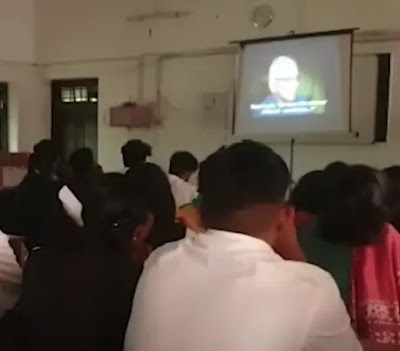Why is the BBC documentary dangerous for the BJP? For two weeks, the Bharatiya Janata Party (BJP) has gone berserk over a BBC documentary. The documentary cites a secret British government report that says Prime Minister Narendra Modi had a direct role in the 2002 Gujarat riots. The government has ensured that the film cannot be seen in India. This is surprising. Because even the big critics of BJP do not consider it possible to defeat the Hindutva Party in the next year's Lok Sabha elections. On one hand, where the opposition could not form an alliance, on the other hand, BJP has tremendous power and money. So why worry so much for a short documentary? Although there are many reasons for this, let us explain three here.
The first reason is the 'anti-incumbency' or anti-incumbency atmosphere. Social media cannot accurately predict the popularity of a leader. But it can be predicted whether the popularity of a leader is increasing or decreasing, especially among the educated sections of the society. If you go through what was written about Narendra Modi on Twitter 10 years ago, you will find that almost 100 percent of the comments were in his favor. At present, a large section of the common people are strongly attacking Modi's generals.
For example, the comments of Amit Malbiya (who is in charge of the BJP's technology-driven campaign) are routinely mocked by many Twitter users. They are also continuously attacking pro-Modi editor Sudhir Chowdhary. Such examples are numerous. This matter is a matter of little concern for the BJP. Because, as reflected in the middle class social media. They keep saying that the economic condition of the country is getting worse, jobs are decreasing. Along with this, the fall in the stock market of Gautam Adani, an industrialist close to Modi, and the scams related to it are also included. All this is strengthening the atmosphere of opposition to the entire institution.
Secondly, if we look at the last two Lok Sabha elections, it will be seen that in only two states of India, Bihar and Uttar Pradesh, BJP got more than 30 percent seats. This time their seats are likely to decrease in Bihar; Because, till now the two main anti-BJP parties, Lalu Prasad Yadav's Rashtriya Janata Dal and Nitish Kumar's Janata Dal (United) are running the government together.
The situation of BJP in Uttar Pradesh is also a bit worrying. Because, in the 2022 assembly elections, their seats have come down from 312 (2017) to 255. The number of seats decreased from 71 (2014) to 62 (2019) in the Lok Sabha elections. In other words, the BJP is losing seats in the state with the largest number of seats in India (80 out of 543). Karnataka is the only state among the five states of South India where BJP is not performing well.
Just as this change is being done keeping the elections in mind, in the same way BBC has remembered the Gujarat riots. The riots that took place 20 years ago should not be known to the small children who will be the first to vote in the coming elections. First-time voters in India are about 2 percent. He was shown the role of Narendra Modi in the documentary. Still, if the BJP had allowed the documentary to be screened, it would have had to accept that there is no difference between a democracy in India and a democracy in Northern or Western Europe. This cannot happen in the politics of the subcontinent, it did not happen.
Of particular concern to the BJP is its good past record. In the 2019 Lok Sabha elections in North and West India (where BJP has its major vote bank), the BJP alone or its allies won either all the seats or less than one or two in almost every major state. There is no room for improvement in 'performance'. The only exception is Maharashtra. In such a situation, it is difficult to say that if some seats are reduced in the three major states of Bihar, Uttar Pradesh and West Bengal, whether the BJP alone will be able to get the required number (272) for the majority or not. 42 seats in the last election).
The third reason is related to the second. The top six states in India in terms of Muslim population are Jammu and Kashmir, Assam, West Bengal, Kerala, Uttar Pradesh and Bihar. Of India's 17 to 18 crore Muslims, roughly 12 crore are in these six states. Of these, the number of seats in Jammu and Kashmir is minuscule, the BJP holds almost all the seats in Assam and it is unlikely to do very well in West Bengal or Kerala. So Bihar and Uttar Pradesh were left behind; Where there is a risk of adverse consequences, efforts can be made to prevent them. Because, the traditional power of Hinduism is strong in both these states.
The Muslim population in Bihar and Uttar Pradesh is 17 and 20 per cent respectively. That is, the Muslim community has a big vote in both these states. Of these, 80 to 85 percent are backward Muslims. On 17 January, the day the first episode of the BBC documentary aired, the Prime Minister told officials about the need to work among the poor, Bohras (Ismaili Shias) and educated Muslims. He had said the same in July last year.
In fact, the Hindutva organization Rashtriya Swayamsevak Sangh (RSS) has started working towards this goal. Three important RSS leaders, Indresh Kumar, Ram Lal and Krishna Gopal, recently held a three-hour meeting with a group of representatives from the educated sections of the Indian Muslim community. The meeting was attended by political, religious leaders and accomplished professionals from the civil society on behalf of the Muslim community. In that discussion, the delegates openly expressed their concerns. Malik Mohtsim Khan, a senior official of Jamaat-e-Islami, one of the largest Islamic organisations, said this included physical attacks on Muslims, hate speeches, bulldozing of homes of minority communities in various states and attempts to remove mosques. including legal action by Hindu organizations for in India.
RSS leaders also explained the issues from their perspective. Although the RSS has spoken to Islamic organizations in the past, but in the context of present-day India, it is almost a revolutionary phenomenon that the top leadership of an organization following the ideology of Hindu Rashtra is listening to criticism from its leaders and workers. From other organizations including Jamaat-e-Islami.
How can this new politics be explained? According to observers, since the number of seats is unlikely to increase in place of their numbers and there is a fear of losing seats in Bihar, Uttar Pradesh and West Bengal, it is about 15 to attract the votes of the Muslim community. Strategic changes to the percentage of the country (100 Lok Sabha seats have 20 per cent or more Muslim votes) or to divide it among several parties. However, it is important to remember that according to various surveys, Narendra Modi's popularity in India is still intact. Yet, the tactical changes the BJP is making show how cautious they are. This caution is the main reason for his success.
Just as this change is being done keeping the elections in mind, in the same way BBC has remembered the Gujarat riots. The riots that took place 20 years ago should not be known to the small children who will be the first to vote in the coming elections. First-time voters in India are about 2 percent. He was shown the role of Narendra Modi in the documentary.
Still, if the BJP had allowed the documentary to be screened, it would have had to accept that there is no difference between a democracy in India and a democracy in Northern or Western Europe. This cannot happen in the politics of the subcontinent, it did not happen.




0 Comments